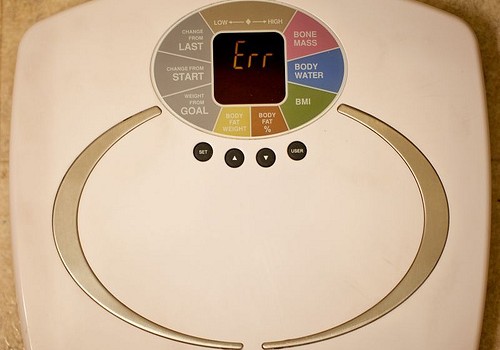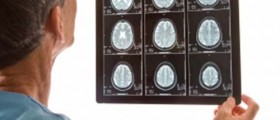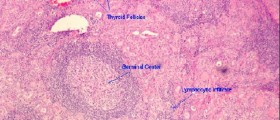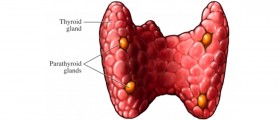
The Thyroid Gland
The thyroid, is the 'master metabolism gland.' This butterfly-shaped gland, is located in the front of the neck, below the Adam's apple. It is responsible for transporting iodine from the diet to produce thyroid hormone. This hormone affects an individual's energy levels, temperature, weight, mood and overall general well-being. Thyroid diseases typically fall into two broad groups of disorders: abnormal function and abnormal nodule growth in the thyroid gland. Functional disorders involve the production of too little thyroid hormone (hypothyroidism) or too much thyroid hormone (hyperthyroidism). Nodules that are benign are more common and do not usually cause serious health problems. They usually occur when there is abnormal growth from cells in the nodule. The growth of too large nodules can cause pressure in the neck area making it difficult to breathe, speak and swallow. That said, the thyroid tend to function normally even when nodules are present. The good news is that most thyroid problems can be detected and treated, and thyroid cancers are also less common than benign nodules. With treatment, thyroid disorders and cancer is more than 90 percent successful. To this end, it is critical that thyroids problems are diagnosed as early as possible, and controlled...
The thyroid, is the 'master metabolism gland.' This butterfly-shaped gland, is located in the front of the neck, below the Adam's apple. It is responsible for transporting iodine from the diet to produce thyroid hormone. This hormone affects an individual's energy levels, temperature, weight, mood and overall general well-being. Thyroid diseases typically fall into two broad groups of disorders: abnormal function and abnormal nodule growth in the thyroid gland. Functional disorders involve the production of too little thyroid hormone (hypothyroidism) or too much thyroid hormone (hyperthyroidism). Nodules that are benign are more common and do not usually cause serious health problems. They usually occur when there is abnormal growth from cells in the nodule. The growth of too large nodules can cause pressure in the neck area making it difficult to breathe, speak and swallow. That said, the thyroid tend to function normally even when nodules are present. The good news is that most thyroid problems can be detected and treated, and thyroid cancers are also less common than benign nodules. With treatment, thyroid disorders and cancer is more than 90 percent successful. To this end, it is critical that thyroids problems are diagnosed as early as possible, and controlled accordingly. It is important to note that one does not have to experience all of the usual symptoms in order to be diagnosed with a thyroid disorder. As such, it is important to know seven of the most common signs that you could have a thyroid condition:

1.Family: The Ties That Bind
Individuals with a family history of thyroid problems, are more likely to be at a higher risk, and being predisposed to having thyroid malfunctioning and related conditions. That said however, it is also very common for many individuals to be cluelessly unaware of thyroid problems in their families. The condition is further exacerbated by the fact that older generations have often referred to thyroid problems as having 'goiter' and 'gland' problems. To this end, particular attention must be paid to discussions regarding goiter, gland conditions, and weight gain or obesity as a result of “glandular problems," since these are more archaic, older, and indirect ways of referring to thyroid conditions.

2. Where It Hurts: Joint and Muscle Pains
An onset of body aches and pains, weakness in the arms and legs and even carpal tunnel and similar conditions could be symptoms of thyroid problems. Carpal Tunnel Syndrome, is a disorder which involves pain, tremors, tingling, weakness, achiness and numbness in the wrist, fingers or forearm. It is due to swelling of membranes that compress a nerve in the forearm. Hypothyroidism tend to cause a variety of muscle and joint-related symptoms, such as swelling of the muscles, and tenderness and pressure on the nerves. Sufferers usually experience : Muscle spasms, weaknesses, tremors, pain, cramps and stiffness, swelling that causes pressure on the nerves, and stiff, painful, achy joints.
- Important notification about information and brand names used in this slideshow!
- Photo courtesy of Mr Samuel Body by Flickr : www.flickr.com/photos/mrtomlong/1323333369/

3. Changes in Skin and Hair
What are the odds? Two of the things we obsess about the most? Our skin and our hair. Well, turns out, and as 'luck' would have it, the skin and hair are especially vulnerable to thyroid disorders-go figure! Hypothyroidism as well as hyperthyroidism do cause hair to fall out, and in some cases major alopecia. In cases of hypothyroidism (too little hormone): Hair becomes coarse, dry, brittle and breaks and falls out, even in the eyebrows. Additionally, the skin is rough, dry, thick, and scaly. In the case of hyperthyroidism(too much hormone) the thyroid gland gets overactive. As such, a condition of hyperthyroidism usually involves a more severe hair loss and more severe, fragile skin conditions. All is not lost however. There is a silver lining: The good news is that if and when treated appropriately by an experienced medical doctor or expert, the hair can grow back, and the skin can also regain its normal functioning and properties.

4. Bowel, Fertility, and Menstrual Irregularities
Periods of long and severe constipation are often related to hypothyroidism, whereas diarrhea as well as irritable bowel syndrome are mostly relate to hyperthyroidism. Infertility can also be related to thyroid conditions. Menstrual irregularities, including but not limited to more frequent, more painful, and heavier periods are also often associated with hypothyroidism, while more infrequent, irregular, shorter, and lighter periods are associated with hyperthyroidism. A woman's menstrual and fertility related issues as and if they relate to thyroid conditions can be determined with the help of an evaluation of their thyroid antibodies, blood serum levels of Free T3 and/or T4, which are thyroid hormones as well as thyroid stimulating hormone (TSH).

5. Cholesterol and Weight Issues
Cases of high cholesterol, especially unresponsive diet and exercise, and statins(cholesterol-lowering medications), can be a sign of undiagnosed hypothyroidism. Unexplained weight changes and issues can be signs of hypothyroidism: For many individuals, even after religiously following years of monitored dieting and exercise become overwhelmed with despair and disappointment as they do not see positive results. For such individuals, hypothyroidism is often the culprit at the forefront of this weight loss sabotage. Since the thyroid gland regulates metabolism, hypothyroidism immobilizes and impairs the body's fat burning abilities. This slows the processing, synthesis, and burning of fats and prevents weight loss. On the other hand, in Hyperthyroidism, the body makes too much hormone. In many cases, this causes Graves' disease and when this happens the body's own immune system attacks the thyroid gland. As a defence mechanism or reaction, the thyroid gland then counter attacks and fights back. It does so by generating or producing too much of the thyroid hormone, which often results in low cholesterol levels.
- Important notification about information and brand names used in this slideshow!
- Photo courtesy of Joint Task Force Guantanamo by Flickr : www.flickr.com/photos/jtfgtmo/4818196390/

6. Anxiety and Depression
Anxiety, depression and other sudden onset panic disorders, particularly those that are unresponsive to tranquilizers and anti-depressants could be signs of undiagnosed thyroid disorders. Hyperthyroidism is more often associated with anxiety and panic attacks while hypothyroidism is mostly associated with depression. Studies have indicated that in individuals with anxiety, depression, and many other psychiatric problems, tend to have abnormal thyroid hormone levels in their blood. When treated, they experience dramatic improvements in cognition, memory, mood and overall well-being. In the future, treating thyroid-related depression, anxiety and other psychiatric symptoms could potentially manage and prevent even further cognitive decline in the years to come.
- Important notification about information and brand names used in this slideshow!
- Photo courtesy of trublueboy by sxc.hu : www.sxc.hu/photo/558236

7. Weight Changes
Too often and too many individuals follow low-fat, low-calorie diets and participate in strict and rigorous exercise programs, only to remain stagnant. They struggle to lose and or gain weight, while most individuals with 'normal' thryroid functioning do. Doing all the right things, but are experiencing unexplained and major difficulties and stagnation in trying to lose weight such as: Losing weight , and you have been eating the same and the usual amount of food as you did in the past, or experiencing weight loss while eating more than what is normal for you? Chances are you have a thyroid problem, and should see your doctor immediately for a professional evaluation and treatment.
- Important notification about information and brand names used in this slideshow!
- Photo courtesy of -Paul H- by Flickr : www.flickr.com/photos/-paulh/4517197776/

Fatigue
Hyperthyroidism interferes with sleep, which causes overwhelming tiredness, fatigue, and exhaustion. In classic hyperthyroidism, there is usually 'night-time insomnia' which leaves people feeling exhausted all day, even after getting more than 8 hours of sleep. Additionally, the condition causes the thyroid to produce excess adrenaline, which places the body in a situation similar to the "fight or flight" response all the time. When this occurs, it is as if the body is never resting or relaxed, rather it is in a constant 'on' mode, which is exhausting. This also creates exhaustion in our muscles and joints, making it difficult and impossible to have the energy to physically move. If you experience any or all the above-mentioned symptoms, or if you have been and are concerned about exposure to radiation and iodine-131, you should see your doctor immediately. This will include a check for thyroid disorders which typically involves a thyroid evaluation conducted by an experienced doctor or medical professional. Overall, thyroid problems that go undiagnosed also dramatically increase the risk of anxiety, depression, hair loss, heart disease, obesity, sexual dysfunction, infertility, general malaise, and and a plethora of other related symptoms and health problems. Do not wait-play it safe...
Hyperthyroidism interferes with sleep, which causes overwhelming tiredness, fatigue, and exhaustion. In classic hyperthyroidism, there is usually 'night-time insomnia' which leaves people feeling exhausted all day, even after getting more than 8 hours of sleep. Additionally, the condition causes the thyroid to produce excess adrenaline, which places the body in a situation similar to the "fight or flight" response all the time. When this occurs, it is as if the body is never resting or relaxed, rather it is in a constant 'on' mode, which is exhausting. This also creates exhaustion in our muscles and joints, making it difficult and impossible to have the energy to physically move. If you experience any or all the above-mentioned symptoms, or if you have been and are concerned about exposure to radiation and iodine-131, you should see your doctor immediately. This will include a check for thyroid disorders which typically involves a thyroid evaluation conducted by an experienced doctor or medical professional. Overall, thyroid problems that go undiagnosed also dramatically increase the risk of anxiety, depression, hair loss, heart disease, obesity, sexual dysfunction, infertility, general malaise, and and a plethora of other related symptoms and health problems. Do not wait-play it safe.
- Important notification about information and brand names used in this slideshow!
- Photo courtesy of Lee Haywood by Flickr : www.flickr.com/photos/leehaywood/4231062280/


























Your thoughts on this
Loading...